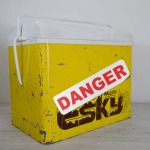 There it was, an esky. Just a small esky, sitting on the footpath outside the Bathurst post office. Next thing you know, the whole street has been cordoned off and there are cops everywhere. The cops don’t want to touch it, lift the lid. They do a bit of thermal imaging on it, from a distance. Looks like it’s empty. It’s probably empty.
There it was, an esky. Just a small esky, sitting on the footpath outside the Bathurst post office. Next thing you know, the whole street has been cordoned off and there are cops everywhere. The cops don’t want to touch it, lift the lid. They do a bit of thermal imaging on it, from a distance. Looks like it’s empty. It’s probably empty.
Eventually, after some hours, the all-clear. It’s just an esky.
All the way through this adventure, the police referred to it as a “suspicious package”. That sounds more important, more fearsome, than esky. Esky is a friendly little word, redolent of backyard barbies, camping, car-race watching. “We are concerned about a suspicious package,” sounds more dignified than: “We are concerned about an empty esky.”
But these are days of terror, and people are twitchy.
It would appear there’s no actual terror around here. I just went to the playing fields with Bertie, under a big blue sky with fluffy clouds. I stopped at the Visitors’ Centre cafe to grab a coffee, tying Bertie to the bike rack. The waitress ran out with a white plastic jug of water to pour into the dog bowl, because it’s a hot day. It was only in the car on the way home, coffee in the holder, Bertie panting in the back, that I was reminded about the terror. “Paris has seen terror before but not on this scale,” came the sound of a BBC reporter’s voice.
What complete nonsense that sentence was. Paris has known terror before, and on a far grander scale than last week’s atrocity. There was, for example, The Terror, the days of heads rolling away from the guillotine during the French Revolution, the same revolution celebrated every July 14. The war on Jews in Vichy France. And in October 1961, the massacre of 200 Algerians marching in favour of their country’s independence from France. Deep in her heart, Paris knows all about terror.
Terror is being perpetrated all the time, in many parts of the world, mostly affecting non-white residents of countries that don’t capture our imaginations the way Paris does. Paris is a mental home away from home, so we’re twitchy.
Meanwhile, with attention focused on the suspicious esky, Bathurst Regional Council was voting Yes to a quarry at Napoleon Reef. Local residents who had fought for eight months against the proposal – citing loss of biodiversity and negative impacts on a residential area – watched as the motion was moved by Coote, Seconded by Aubin, supported by Westman and Morse. North abstained (non pecuniary interest) and Hanger voted against, giving a final vote of 4 to 1. Councillors Bourke and Jennings were absent.
At the same time, the latest State of the Environment report was tabled, in which the importance of local biodiversity was underlined. Clearly, we are to process such information in different parts of the brain. Quarries are to be dealt with in the “economy” part of the brain; “biodiversity” is to be dealt with in the abstract, feel-good, environmental part of the brain. This means you can vote for a quarry that will destroy a fragile environment at the same time as you express support for biodiversity – as a concept. This allows you to hold competing ideas in the brain at the same time without falling into the abyss of cognitive dissonance.
I’m totally pissed off, to be honest. ISIS terrorists are getting everyone to play right into their hands. Paris is all about terror, now, swamping media coverage in the lead-up to the crucial climate change talks. Facebook is awash with people throwing up their hands and giving up on the human race, the sort of nihilism that makes you turn to sites like Cake Wrecks for relief (as I did last night, for an embarrassingly long time). Polls in Britain are supporting on-ground war against Islamic State. And here in Bathurst, we don’t just pave paradise, we dig another bloody great big hole.
But there is hope. Here’s Jack Black and current Internet cat sensation, Lil Bub, urging us to send a message to Paris:

